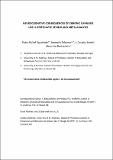Files in this item
Neurocognitive consequences of chronic cannabis use : a systematic review and meta-analysis
Item metadata
| dc.contributor.author | Figureiredo, Pedro | |
| dc.contributor.author | Tolomeo, Serenella | |
| dc.contributor.author | Steele, Douglas | |
| dc.contributor.author | Baldacchino, Alexander Mario | |
| dc.date.accessioned | 2020-11-09T00:38:19Z | |
| dc.date.available | 2020-11-09T00:38:19Z | |
| dc.date.issued | 2020-01 | |
| dc.identifier | 260588928 | |
| dc.identifier | c86dd386-9cbe-4a72-ae55-69d0ae8deae5 | |
| dc.identifier | 85076029642 | |
| dc.identifier | 000505535400026 | |
| dc.identifier.citation | Figureiredo , P , Tolomeo , S , Steele , D & Baldacchino , A M 2020 , ' Neurocognitive consequences of chronic cannabis use : a systematic review and meta-analysis ' , Neuroscience and Biobehavioral Reviews , vol. 108 , pp. 358-369 . https://doi.org/10.1016/j.neubiorev.2019.10.014 | en |
| dc.identifier.issn | 0149-7634 | |
| dc.identifier.other | ORCID: /0000-0002-5388-7376/work/64698183 | |
| dc.identifier.uri | https://hdl.handle.net/10023/20924 | |
| dc.description.abstract | Cannabis is currently the most used illicit substance in the world with a global widespread distribution. Although its acute neurocognitive effects on human behaviour have been reported, there is a lack of robust analysis investigating the link, if any, between chronic cannabis use and neurocognitive function. A systematic review of the literature was conducted in order to identify relevant studies published from 2010 to 2019. A meta-analysis was performed on 13 selected studies testing performance of chronic cannabis users compared with non-users in six different neurocognitive domains. There was a low cross-sectional association between neurocognitive impairments and chronic cannabis use in cognitive impulsivity, cognitive flexibility, attention, short-term memory and long-term memory. No association was found between chronic cannabis use and motor impulsivity. By analysing a specific target population with strict inclusion criteria, these findings provide inconclusive evidence that there are cognitive impairments associated with chronic cannabis use. Future research is needed to determine if the findings of this metaanalysis are biased by the methodological limitations encountered. | |
| dc.format.extent | 759454 | |
| dc.language.iso | eng | |
| dc.relation.ispartof | Neuroscience and Biobehavioral Reviews | en |
| dc.subject | Cannabis | en |
| dc.subject | Chronic cannabis use | en |
| dc.subject | Neuropsychology | en |
| dc.subject | Impulsivity | en |
| dc.subject | Memory | en |
| dc.subject | Intelligence | en |
| dc.subject | Attention | en |
| dc.subject | Cognitive flexibility | en |
| dc.subject | Meta-analysis | en |
| dc.subject | RA0421 Public health. Hygiene. Preventive Medicine | en |
| dc.subject | RC0321 Neuroscience. Biological psychiatry. Neuropsychiatry | en |
| dc.subject | E-NDAS | en |
| dc.subject | BDC | en |
| dc.subject | R2C | en |
| dc.subject | SDG 3 - Good Health and Well-being | en |
| dc.subject.lcc | RA0421 | en |
| dc.subject.lcc | RC0321 | en |
| dc.title | Neurocognitive consequences of chronic cannabis use : a systematic review and meta-analysis | en |
| dc.type | Journal article | en |
| dc.contributor.institution | University of St Andrews. School of Medicine | en |
| dc.contributor.institution | University of St Andrews. Centre for Minorities Research (CMR) | en |
| dc.contributor.institution | University of St Andrews. Population and Behavioural Science Division | en |
| dc.identifier.doi | 10.1016/j.neubiorev.2019.10.014 | |
| dc.description.status | Peer reviewed | en |
| dc.date.embargoedUntil | 2020-11-09 |
This item appears in the following Collection(s)
Items in the St Andrews Research Repository are protected by copyright, with all rights reserved, unless otherwise indicated.

